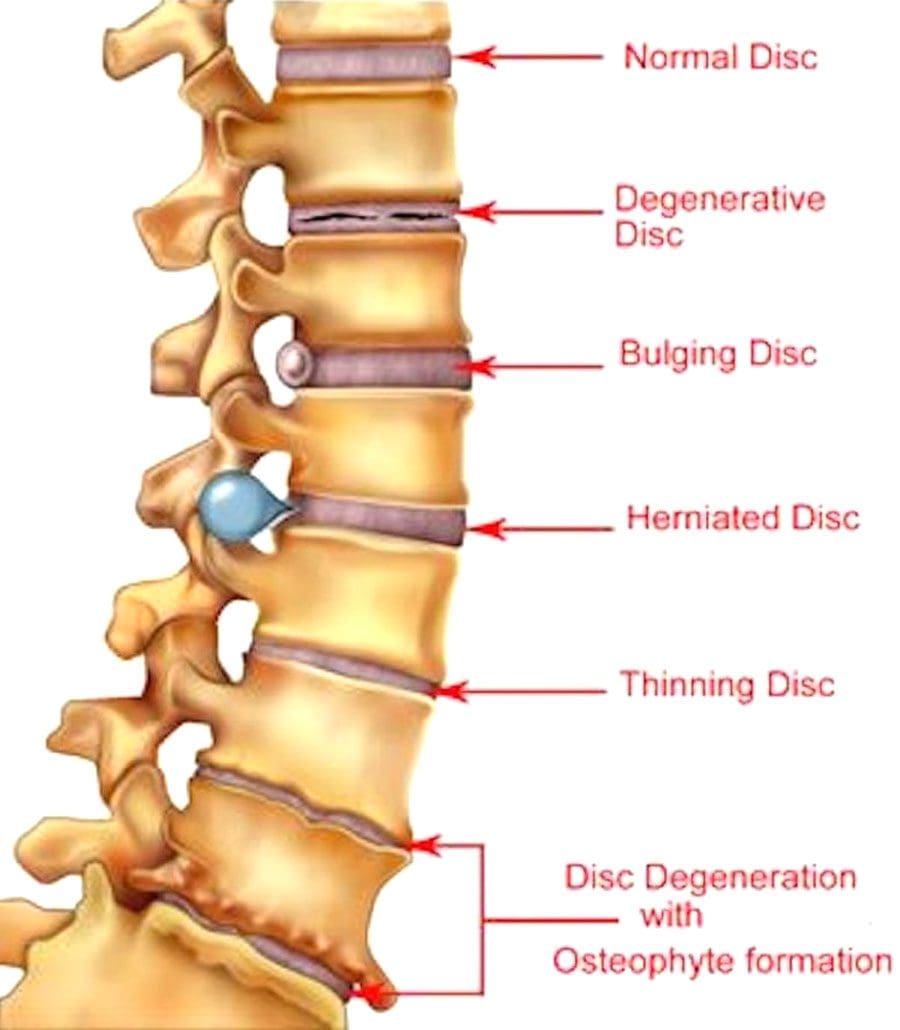Spine Conditions and Diabetes: Uncontrolled diabetes can wreak havoc on multiple organ systems, including:
- The cardiovascular system
- Neurological systems
- Kidneys
- Eye health
Diabetes and severe blood sugar fluctuations can lead to back pain and spinal conditions. The negative impacts on the body from diabetes can be destructive as it is a state of chronic inflammation.

Spine Conditions and Diabetes
Spinal conditions being researched and their link to diabetes can affect each condition and its development differently.
Spinal Stenosis
- Spinal stenosis is when the spine’s openings foramina begin to shrink and narrow, causing the nerve roots that branch off the spinal cord to have less space to function.
- The stenosis can compress one or more lumbar spinal nerves.
- Pain, tingling, weakness, and/or numbness in the legs can begin to present.
Spinal Epidural Abscess
- Spinal epidural abscess is an infection between the vertebral bones and the spinal cord membrane.
- Diabetes increases the risk of infection and increases the risk of developing an abscess.
- Hypertension and obesity can also increase the risk of infection.
Lumbar Disc Degeneration
- The back contains spinal discs between each vertebra that are the shock absorbers.
- Lumbar disc degeneration occurs when one or more discs begin to break down.
- The disc’s deterioration causes changes in the lumbar/lower back structure.
- The degeneration also causes back pain.
Disc degeneration is a normal part of aging and is expected. However, those who have lived with diabetes for over ten years have a higher risk of developing advanced lumbar disc degeneration. To prevent disc degeneration and/or minimize the adverse effects, it’s essential to maintain blood sugar levels.
Vertebral Osteomyelitis
- Vertebral osteomyelitis is a rare spinal infection resulting from a spinal injury or post-surgical complication/s.
- It is a bacterial infection that can travel to the spine from another location.
- Diabetes increases susceptibility to infections.
- For example, an individual with diabetes could have a foot ulcer, lower back pain, and a fever, symptoms that could indicate the development of vertebral osteomyelitis.
Chiropractic and Decompression Therapy
Spinal decompression is an effective non-surgical technique that can relieve back pain, leg pain, and symptoms associated with spinal conditions and disorders. It works by gently creating traction/pulling force with a specialized mechanical decompression table combined with chiropractic massage and adjustments. Benefits include:
Pain relief
- Decompression relieves tension in tight, spasming, or injured muscles.
- Stimulates the nervous system to release chemical signals that bring pain relief.
Heals spinal disc tissues
- Decompression creates a vacuum force on the spinal discs, helping to circulate much-needed fluids, cells, and other substances to the damaged tissue/s.
Restores spinal disc and joint alignment
- Stress, poor posture, poor body mechanics, and other factors can cause joints to shift out of place or the discs to herniate.
- The vacuum force helps realign the joints and discs.
- Prevents further pain and inflammation.
- Restores mobility and function.
Relieves pressure on nerves
- Spinal nerves can get pinched when discs, bones, or other tissues compress the small spaces causing inflammation and pain.
- Non-surgical decompression increases the space around the nerves, allowing the nerves to heal.
Injury Medical Chiropractic and Functional Medicine Clinic offer spinal decompression as one of many treatment approaches that make a difference in our patients’ quality of life and functional outcomes.
DOC Decompression Table
The information herein is not intended to replace a
one-on-one relationship with a qualified health care professional, or licensed
physician, and is not medical advice. We encourage you to make your own healthcare decisions based on your research and partnership with a qualified healthcare professional. Our information scope is limited to
chiropractic, musculoskeletal, physical medicines, wellness, sensitive health
issues, functional medicine articles, topics, and discussions. We provide and
present clinical collaboration with specialists from a wide array of
disciplines. Each specialist is governed by their professional scope of
practice and their jurisdiction of licensure. We use functional health &
wellness protocols to treat and support care for the injuries or disorders of
the musculoskeletal system. Our videos, posts, topics, subjects, and insights
cover clinical matters, issues, and topics that relate to and support, directly
or indirectly, our clinical scope of practice.* Our office has made a reasonable
attempt to provide supportive citations and has identified the relevant
research study or studies supporting our posts. We
provide copies of supporting research studies available to regulatory boards
and the public upon request.
We understand that we cover matters that require an
additional explanation of how it may assist in a particular care plan or
treatment protocol; therefore, to further discuss the subject matter above,
please feel free to ask Dr. Alex
Jimenez or contact us at 915-850-0900.
Dr.
Alex Jimenez DC, MSACP, CCST, IFMCP*, CIFM*, ATN*
email: coach@elpasofunctionalmedicine.com
Licensed in: Texas & New Mexico*
References
Anekstein, Yoram, et al. “Diabetes mellitus as a risk factor for the development of lumbar spinal stenosis.” The Israel Medical Association journal: IMAJ vol. 12,1 (2010): 16-20.
Eivazi, Maghsoud, and Laleh Abadi. “Low back pain in diabetes mellitus and importance of preventive approach.” Health promotion perspectives vol. 2,1 80-8. 1 Jul. 2012, doi:10.5681/hpp.2012.010
Heuch, Ingrid et al. “Associations between serum lipid levels and chronic low back pain.” Epidemiology (Cambridge, Mass.) vol. 21,6 (2010): 837-41. doi:10.1097/EDE.0b013e3181f20808
Rinaldo, Lorenzo, et al. “Diabetes and Back Pain: Markers of Diabetes Disease Progression Are Associated With Chronic Back Pain.” Clinical diabetes: a publication of the American Diabetes Association vol. 35,3 (2017): 126-131. doi:10.2337/cd16-0011




